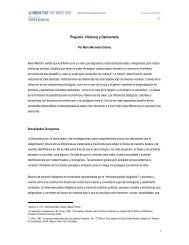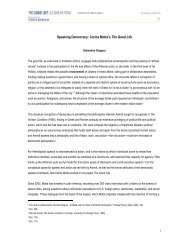Carlos Motta - La buena vida
Carlos Motta - La buena vida
Carlos Motta - La buena vida
You also want an ePaper? Increase the reach of your titles
YUMPU automatically turns print PDFs into web optimized ePapers that Google loves.
122<br />
123<br />
Hummers, Mercedes. One after another, all<br />
the big politicians are arrested on corruption<br />
charges. A minister is sentenced to five years for<br />
possession of foreign alcohol. A chill descends on<br />
the Dhaka party scene. Everyone starts flushing<br />
their stash down toilets, or better yet down their<br />
own gullets. Beer, vodka, gin. For the younger set,<br />
yabba is the party drug. A lethal amphetamine<br />
from Thailand, now locally manufactured. Mad<br />
Dog and Pink Pleasure. Honeyed brand names<br />
that drip off tongues. The big yabba dealer in town<br />
is busted. Surprise, he turns out to be a relative of<br />
one of the politicians. Another round of politicians<br />
to jail. I don’t think anyone sheds a tear for these<br />
political godfathers. But we’re jittery, because we<br />
wonder what will come when there are no more<br />
politicians. And why are the Islamists left alone?<br />
Something wicked this way comes.<br />
Perhaps some are waiting for the<br />
“international community” to step in and<br />
“restore” democracy. That fabled Gandalf the<br />
good. But no one wants to disturb plans to install<br />
a Muslim-led UN peacekeeping force in post-<br />
America Iraq. With Pakistan out of the running,<br />
Bangladesh is the next candidate for the mission.<br />
So many players in this double-decker chess<br />
game. Only tunnel and tunnel, no visible light.<br />
I’m not the last man in front of the Tiananmen<br />
tanks. I wish I could be that brave, but I’m not.<br />
But there are still protesters on the university<br />
campus. They haven’t given in just yet. Their<br />
message is painted on the dormitory walls. If<br />
you’re going to end politics, don’t tell me it’s for<br />
my own good. Kill me before you kill my time.<br />
The caretakers assure us there will be<br />
elections in December 2008. The army is<br />
supervising voter list registration, with computer<br />
equipment that will create biometric national<br />
ID cards. At the registration center, my mother’s<br />
fingerprints don’t register on the scanner.<br />
“You’re old,” says the smooth faced man, “your<br />
fingerprints have rubbed away.” I’m in the next<br />
room – there are murmurs as people cut the line<br />
in front of us, breaking the orderliness. An old<br />
man dryly remarks, “There are no aliens from<br />
another planet, everyone comes from the same<br />
mother. Even if you beat it with a stick, the snake<br />
remains crooked.”<br />
But I keep thinking that planned history will<br />
not work. Bengalis still want a choice, rather than<br />
a lobotomy that births a nation of shoppers. We<br />
are not quite ready for our Singapore moment.<br />
Naeem Mohaiemen is an artist who uses<br />
video+archive to explore historical markers,<br />
including national security panic and failed<br />
revolutions. More info: www.shobak.org<br />
alternative<br />
economics,<br />
alternative<br />
societies<br />
oliver ressler<br />
The ongoing exhibition project Alternative<br />
Economics, Alternative Societies (2003 – 2007)<br />
by Oliver Ressler focuses on diverse concepts and<br />
models for alternative economies and societies,<br />
which all share a rejection of the capitalist system<br />
of rule. An interview was carried out for each of<br />
the 16 concepts, which are presented as 20 to 37<br />
minutes long videos. Interview partners include<br />
economists, political scientists, authors, and<br />
historians. The following are three transcription<br />
excerpts of video interviews carried out for the<br />
project Alternative Economics, Alternative<br />
Societies.<br />
the socialism of<br />
the 21st century<br />
heinz dieterich<br />
Transcription excerpt of a video by O. Ressler,<br />
recorded in Rotenburg / Wümme, Germany,<br />
26 min., 2007<br />
The basic premise of my book is that you need<br />
to have certain objective conditions to have<br />
democracy; you cannot have democracy, just<br />
as a wish, and impose it on any objective world<br />
scenery or acting. First of all, there has to be a<br />
certain level of material well being, you need<br />
a certain quality of life. That implies that you<br />
can have a very extensive educational system,<br />
which is open and free for all, and then of course<br />
you must have the willingness in the people to<br />
have a democratic society instead of, let’s say,<br />
a theocratic society. At the end, you need an<br />
economy that sets you free from unnecessary<br />
work so that you have time to participate in<br />
public affairs. I think these conditions have<br />
been reached today so that the authoritarian<br />
development of social democracy and historic<br />
socialism in eastern Europe was a phenomena<br />
much due to the circumstances of the World<br />
Wars, the Second World War and then of the<br />
Cold War, and that there’s no need to have that<br />
once again. You cannot substitute democratic<br />
participation by the rule of surrogate force, the<br />
Communist Party in that case, neither, of course,<br />
of a capitalist elite, and, neither, of course, of a<br />
state bureaucracy. So, I think we’ve all learned<br />
from these things. The objective conditions<br />
are much more prone to a real participatory<br />
democracy. I think there’s never been a better<br />
chance to have a real direct democracy than we<br />
do have today. […]<br />
I think it is a misunderstanding to think that<br />
participatory democracy will be that everybody<br />
decides any trivial subject. That was tried in<br />
the French Revolution and, of course, it leads to<br />
immediate breakdown of operational capacity<br />
of the state. First of all, it’s impossible that<br />
everybody decides on everything. And, second,<br />
it’s not necessary. The trivial things in a small<br />
village; they have to decide if they put lights in the<br />
streets or not, that doesn’t mean a referendum,<br />
I guess. So you will have a mixture of direct<br />
democracy where you have electronic plebiscites<br />
and referenda and of representative democracy.<br />
And, the important thing is that you extend<br />
direct democracy to the economic, the political,<br />
the cultural and the military sphere. You cannot<br />
exclude any of these four basic social relations,<br />
which form our life. And, that of course, requires<br />
another objective condition. People must have<br />
free time to inform themselves what economists<br />
know, what political scientists know and so on.<br />
They need time to debate alternatives. So direct<br />
democracy today is possible because you have<br />
the technological basis, the Internet. You need<br />
the decision and information transmission in real<br />
time in gigantic geographical spaces. And, that<br />
we can do today. So for the first time since the<br />
Greeks, that it is really possible to have a direct<br />
democracy, where the will of the people decide<br />
the important issues.<br />
Heinz Dieterich, author of “Socialismo del<br />
Siglo XXI” (1996), professor of the Universidad<br />
Autónoma Metropolitana in Mexico City.<br />
libertarian municipalism<br />
chaia heller<br />
transcription excerpt of a video by O. Ressler,<br />
recorded in Leverett, U.S.A., 32 min., 2005<br />
Libertarian municipalism is the political branch<br />
of social ecology. [Murray] Bookchin really<br />
comes out of the Marxian tradition, believing<br />
that philosophy needs to be alive in the world,<br />
and needs to be in the service of human<br />
kind. Libertarian municipalism is basically a<br />
philosophy that says, that everyday people,<br />
citizens, cities and towns and villages across<br />
the world are rationally capable of governing<br />
themselves. And what he tries to do is balance<br />
principles of autonomy and cooperation through<br />
the philosophy of libertarian municipalism,<br />
by saying what would happen if you had<br />
communities that had autonomy on a local level,<br />
but that that autonomy was always limited by<br />
and in dialogue with a larger collectivity, which<br />
would be the confederation. So there is a tension<br />
between the self-governing municipality, which<br />
would be a self-governing city, town or village,<br />
and the larger confederation, that the city or<br />
town or village is part of. The citizens are bound<br />
together by sharing a common constitution that<br />
is grounded on a set of ecological and social<br />
principles, and the confederation is bound<br />
together by that same exact constitution.<br />
There is a tremendous concern among leftists<br />
about what is democracy, what ought it to look<br />
like, and what ought it to become. As a social<br />
ecologist, for me there is the sense that we have<br />
the potential to have a direct democracy; which<br />
means, that people in cities, towns and villages




